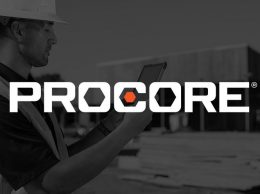
Editor’s note: This article was updated after the market closed at 1 p.m. to reflect Procore’s closing price.
Carpinteria-based Procore Technologies began trading on the New York Stock Exchange on May 20 and saw its share price shoot up 33.7% on its first day, to close at $89.59.
Procore priced shares of its initial public offering at $67, above the indicated range the company gave last week in a filing with the U.S. Securities and Exchanges Commission. At $67 per share, Procore generated $634.5 million from its IPO. That’s around $20 million more than it expected to raise even at the high end of its initial estimate of $60-$65 per share, and it gives the cloud software company one of the biggest IPOs in the history of the tri-county region.
The 33.7% increase on its first day of trading sent Procore’s market capitalization from $8.6 billion at opening to around $11.5 billion. It is now the biggest publicly traded company based in Santa Barbara County and the fourth-largest in the Tri-Counties, trailing only Thousand Oaks biotech giant Amgen, Ventura internet advertising company The Trade Desk, and Thousand Oaks technology and defense conglomerate Teledyne.
Procore offered 9.47 million shares to the public and reserved another 940,000 for purchase within the next 30 days by the underwriters of the deal, which include Goldman Sachs, J.P. Morgan Securities and Barclays Capital. The offering is expected to close May 24, the company said in a May 19 news release.
Craig “Tooey” Courtemanche, the founder and CEO of Procore, will own about 5.4% of the company after its IPO, according to Procore’s amended prospectus, filed May 10 with the SEC. At $89.59 per share, his stake in the company was worth $629.3 million at the end of the trading day on May 20 — $158.7 million more than it was worth at the start of the day.
Procore’s biggest investor is the venture capital firm Iconiq Strategic Partners, which owns 36.6% of the company after the IPO. Another firm, Bessemer Venture Partners, owns 13%.
Procore’s supplies management software to the construction industry. While the IPO is huge for Procore itself, Matt Daly, CEO and founder of StructionSite, a tech project tracking platform company, said it was even bigger for the industry as a whole. Procore is the first big construction tech company to go public, Daly said.
“This sort of carries the hopes and dreams of the entire industry with it,” he said.
Procore’s success means that deep-pocketed investors could be targeting more construction tech companies in the future, Daly said, opening the floodgates to “change the landscape of the construction industry.”
“I describe Procore as the first snowplow of the mountain,” Daly said. “They’ve convinced construction companies to make that first leap into a truly digital world and as a result, they created this clear road behind them for more startups to have opportunity.”
Three years ago, funding for U.S.-based construction tech startups surged by 324% in a year, to nearly $3.1 billion in 2018, according to Crunchbase data. Now, Procore is the first company in the market to reach “decacorn” status, or a valuation over $10 billion.
“That’s an exciting trend for tech companies like ours, but also for the industry,” Daly said.
Daly said he has been aware of Procore since he founded his company in 2016. Right away, he noticed that a lot of the bigger accounts he went into business with “basically demanded that we integrate with Procore.”
“It became very clear to us that this company was doing something special in the industry,” Daly said.
Other startups in the construction tech market came in with a flashier approach, but fizzled out, said Daly. Procore was able to reach this point, he said, because it had “a maniacal focus on building a great and strong company culture.”
“A lot of companies don’t place enough emphasis on that and I tip my hat to them. That is something very few people know about them,” Daly said. “They take people from outside of the industry and try to teach them how to scale culture at their own company. I have never seen anything like it and if they can scale that type of thing, the IPO just gives them more resources to do these types of things for our industry and others.”
Procore has yet to turn a profit, despite its appeal to the market. The company had a net loss of $96.2 million in 2020, up from $83.1 million in 2019 and $56.7 million in 2018, according to its prospectus.
In the first quarter of 2021, Procore’s revenue grew 23% compared to the same quarter a year ago, from $92 million to $114 million.
The company did reduce its net losses, with a net loss of $14 million in the first quarter of 2021, compared to $19 million in the first quarter of 2020.
“Because this is such a successful IPO, I think it definitely removes a lot of that skepticism and it sets the bar pretty clearly where we need to be as a business to get there,” Daly said.
Procore employs more than 1,800 people globally, about half of them on the Central Coast. It had $400 million in revenue in 2020, according to its latest SEC filing, and more than 1.6 million users of its products. Its revenue grew by 38% between 2019 and 2020, and by 55% the previous year.






 Print
Print Email
Email

















